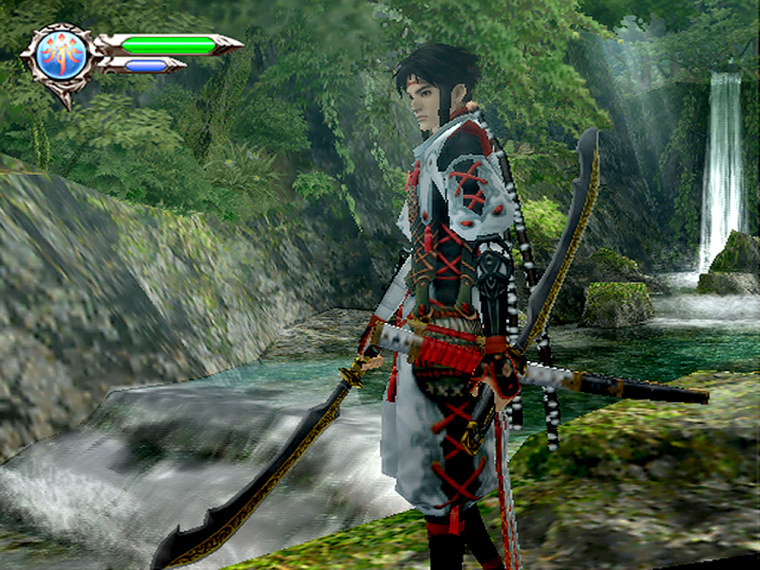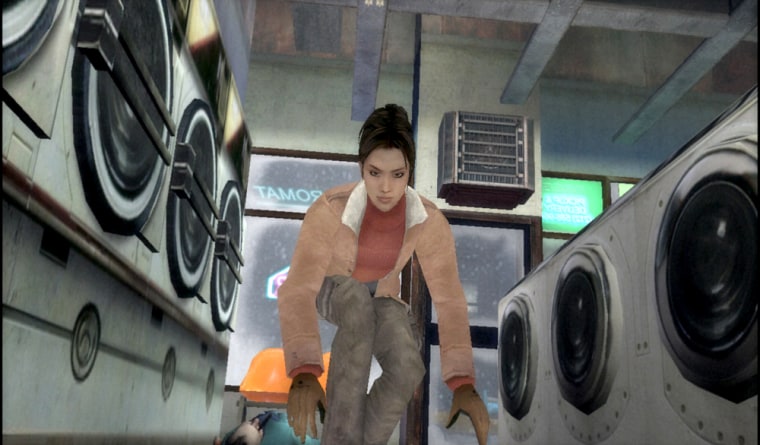Video game makers have been making World War II games longer than than actual war lasted, there are few comic books short of Little Lulu that haven't already been turned into a game and as sure as summer follows spring, we will have a new "Madden" football game next August.
Inspiration for video game fodder may seem limited to war, sports and 'toons, but it doesn't have to be that way. Here are three games with distinctly different inspirations:
"Indigo Prophecy" is a strange game. Strange not for its story of violence and possession and otherworldly beings — gaming's meat and potatoes — but strange in how these themes entwine in ways that bear more resemblance to melodrama than science fiction.
In the opening cut scene a man is stabbed to death in the bathroom of a New York City diner. As it turns out, the killer is you. And when the cut scene gives way to actual game play, your first tasks center around hiding the body, disposing the weapon and leaving the diner without attracting the attention of a policeman nursing a coffee at the counter.
After the body is found — presuming you have managed to escape — detectives arrive at the scene. Now you assume the role of the detectives: quizzing witnesses and dusting for fingerprints.
Jumping between the killer and the two detectives, you must solve two mysteries. As the detectives you must identify and capture the killer. As the killer you must explain the reason for your hallucinatory premonitions and homicidal actions.
But rather than jump into car chases and shoot-outs, "Indigo Prophecy" opts for a more heady experience.
"Indigo Prophecy" is one of those games where the player's actions have a noticeable effect on the plot. As a detective what you choose to investigate determines how soon you will track down your quarry (or not). And as the killer your decisions throughout the game may determine whether you reach the game's end knowing the secret of the prophecy or just a poor homicidal schmuck.
The game's controls are primarily devoted to moving, looking and indicating what objects you would like to interact with. For more traditional action such as fighting the game relies on a button mashing version of Simon Says. Colors flash on screen indicating a sequence of left and right joystick movements. Match the sequence to win.
Simon Says game play appears in less frantic moments, too. During the autopsy of a murder victim early in the game, the mortician spills out more clues as to the cause of death whenever the player succeeds in meeting the sequence.
As the controls betray, "Indigo Prophecy" is not your typical console-based thriller. The settings include gray office cubicles, greasy-spooned diners and snow-covered city parks. There is talk about murder and cults, but also about relationships and insecurity.
The game protagonists — the killer, the killer's brother, the hard-driving female detective and the outwardly happy-go-lucky street-wise detective — all have skeletons in their closets. The bad news is that this means many, many interior monologues. And the ominous sounding music has a habit of peaking during the most mundane discussions of relationships.
The good news is that this approach has a way of allowing you to see the story from a multiple of perspectives, something rare in console gaming. And to underscore that approach, the primary measure for your character's longevity is not the standard health bar, but a mental health bar.
Like the "X-Files," "Indigo Prophecy" is a science fiction story wrapped with all the trappings of a melodrama. This kind of stuff has appeared on the PC before. But "Indigo Prophecy" also appears on the Xbox and PlayStation 2 as well and that's to be admired.
Slow. Primitive even, but nevertheless engrossing. "Indigo Prophecy" reveals its clues slowly and only after listening to too much music and dialogue. But by the end you'll be happy to have stuck with it.
"Facade"
"Facade" skips standard video game tricks completely. It's more of an interactive drama than a game, really, but how this free PC download attempts to meet the challenges of artificial intelligence has relevance for gaming in the future.
The player, or instigator, plays the role of an invited guest to the apartment of Grace and Trip, an urban yuppie couple whose marriage is on the rocks.
Both Grace and Trip hope to use you to heal, or possibly further damage their marriage. Using simple typed commands you can engage them in conversation, or start them talking about another facet of their relationship. Walking through the couple's apartment and picking up their yuppie objets d'art triggers more dialogue.
Occasionally, the couple will ask you for advice or ask you to take sides. You can respond in kind and if "Facade" understands your advice, the story will adjust to the new scenario.
You can engage as a provocateur. In addition to typing some salty language and watching their response, you can hug, comfort or kiss Grace and Trip, breeding confusion and, in more cases than not, your eventual expulsion from the apartment.
I first heard about "Facade" over a year ago while doing research on how video games attempt to evoke emotion. Back then Michael Mateas, a professor of artificial intelligence and entertainment at the Georgia Institute of Technology and Andrew Stern, an artificial intelligence developer and researcher, were on their fourth year developing their one-act interactive play about Grace and Trip.

As Mateas and Stern described the creation of "Facade," the goal was to break the story into "beats" or specific behaviors built for a particular situation. The players’ actions as well as the evolving story determined the beats, which in turn built the story arc.
This process, as they described, amounted to abandoning the decision tree model in many of today's games that supports the illusion of all actions having consequences in favor of a more lifelike experience.
This particular story arc may not hold much allure to the typical gamer — or to any one other than Harold Pinter fans, for that matter. Their yuppie prattle had me wishing for an RPG hack.
But when "Facade" actually works, that is, when Grace and Trip appear to understand your keyed-in responses and when your actions result in an ever downward spiraling string of accusations the feeling of breaking up their acidic relationship can be on par with taking out a "Halo 2" Covenant mothership.
'Genji: Dawn of the Samurai'
OK, so this is one is a war game. But rather than take out Nazis, you're fighting the good fight for 11th century Japanese feudalism. "Genji: Dawn of the Samurai" boasts an unusual inspiration: Game makers say the story line was inspired by "The Tale of Genji," an 11th century text that some literary types hail as the world's first novel.

However, beyond its setting and the names of a couple characters, the hack and slash-happy game shares little with the novel. "The Tale of Genji" is an epic concerning the numerous romantic and political entanglements surrounding a Japanese aristocratic court. There is little romance in the game "Genji" and any political parlay has been reduced to separating heads from shoulders.
But the game pays homage to the original text through graphics which aspire to a certain ancient Japanese idyllic. No forest scenes are complete without bubbling brooks and butterflies and wildflowers that look as if they were hand painted in neon colors.
Warriors flounce around in enough samurai costuming to keep Jean Paul Gaultier awake at night. And when those warriors clash, blood doesn't so much squirt but sprays into misty puffs of blood red.
"Genji: Dawn of the Samurai" is set in a time of national discord. A group of bad guys called the Heishi have disposed of Japan's aristocratic ruling class. Horrors! To help keep feudalism alive the player takes control of young aristocrat Yoshitsune Minamoto and Benkei Musashibo, a warrior-monk — is there any other kind of monk in these types of games?
In the standard combat game the player can employ any number of attacks. In hairy situations the heroes can call upon a magical force calls Amahagane which slows the action — like "The Matrix's" bullet-time — to a more manageable level.
Almost too manageable, in fact, because after the player has mastered the simple combat moves and leveled up his character with the appropriate weapons the game is practically over. "Genji: Dawn of the Samurai" clocks in at about five hours of play.
